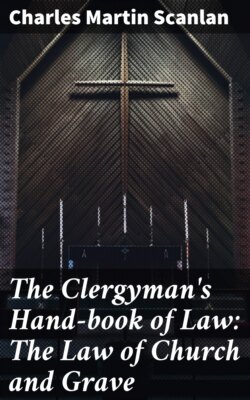Читать книгу The Clergyman's Hand-book of Law: The Law of Church and Grave - Charles Martin Scanlan - Страница 15
На сайте Литреса книга снята с продажи.
Chapter XI. Excommunication
ОглавлениеTable of Contents
131. Definitions, Minor.—Excommunication, as construed in law, is the official announcement by the superior authority of the termination of membership in a religious body and the forfeiture of spiritual privileges of the church. It is one of the methods of discipline in the nature of expulsion from membership in a fraternity, and the fact of expulsion from a church is conclusive proof that the person expelled is not a member of such church. Whether the excommunication was wrong or not can not be examined into in the courts of the State, and such expelled member can not maintain a suit in relation to church property nor vote for trustees.238
132. Major Excommunication.—As excommunication non tolerati affects the rights of citizenship, it is not lawful in England nor the United States. To say that A. has been excommunicated in any form, if untrue, is slander.239
[pg 084]
133. Vote, Sentence.—When a vote of excommunication from a church has been passed in the Congregational church and the offender thereby declared no longer a member, the sentence may be promulgated by being read in the presence of the congregation by the pastor.240
134. Trustees, Disqualified.—The trustees of a church who have been excommunicated are not thereby disqualified in law to act as trustees.241
135. Devise, Void.—A parent may leave money to a child payable in yearly instalments on condition that said child shall continue to be a member of a particular church and attend the regular meetings thereof, and in case he fail so to do that the bequest be thereupon paid to a missionary society. Such a devise is not contrary to the constitution of the State of Wisconsin and is not void for any other reason.242
136. Fraternity, Excommunicated, Bequest.—Where a church member was also a member of an insurance fraternity connected with his church, the constitution of which required that every member of the fraternity should be and remain a practical [pg 085] Roman Catholic, when he was excommunicated from membership in the church he thereby forfeited his benefit certificate in such fraternity.243 Also, a condition that a bequest shall be forfeited if the legatee should not marry a Protestant wife, the daughter of Protestant parents who have always been Protestants, was held to be valid and not an infringement of any constitutional right.244
137. Action, Expulsion.—An action can not be maintained against the parish corporation for expulsion from the church.245
138. Forfeiture of Membership.—Any member may forfeit his membership in a church.246
139. Insubordination, Expulsion, Hearing.—The authorities in the church, under its rules and discipline, have a right to exclude members in the church, for insubordination.247 If the church has no rules as to expulsion of members, the common law prevails, and a member can not be expelled without due notice and fair hearing.248
[pg 086]
140. Injunction, Mandamus, Sepulture.—An injunction will not be granted to prevent the expulsion of a member contrary to the charter and by-laws of the denomination; but if a member be expelled without warrant of law, he has his remedy by mandamus for reinstatement.249 A person who has been expelled can not maintain an action for restoration in order to enjoy the right of sepulture, as it is premature.250
141. Expulsion, Illegal.—The attempt of a minority of a church to expel the majority of the members and turn over the property to another denomination is illegal. However, the same would be true if it were done by the majority.251
142. Freedom, Faith, Doctrine.—The constitution in declaring the freedom of all men to worship God according to the dictates of their own consciences, does not give a church member the right to repudiate the faith and doctrine on which the church was founded, and at the same time to insist on his right to exercise and enjoy the benefits and privileges of a member of such church.252 Every person joining a church, impliedly, if not expressly, agrees to conform to its rules [pg 087] and to submit to its authority and discipline.253 A person who has been expelled from a religious society can not maintain an action for services rendered the society while he was a member.254
[pg 088]
